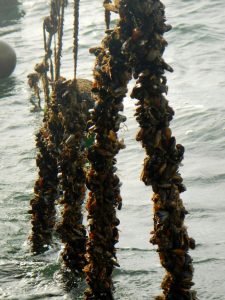
First project partners met with Ph.D. Odd Lindahl, representative from Royal Swedish Academy of Sciences who introduced to his research and practical work which has resulted in developing a mussel meal pilot line in Ellös in 2011. Pilot is financed by European Regional Development Fund project „Submariner”. Processed mussel meal is used for
making pellets for poultry.
Agriculture organizations in Sweden are interested in supporting financially mussel farms in order to diminish the impact on the environment that agricultural activities bring. Therefore a subsidy mechanism is modelled in Sweden to support mussel growing business in future, which according to O.Lindahl could be put into practice in 2015.
The second day brought new ideas by visit to Danish Shellfish Centre „Dansk Skaldyrcenter”. Centre`s main activities are mussel growing research, educating and consulting. „Dansk Skaldyrcenter” gets its income partially (20 – 30 %) from mussel realization, partially from projects financed by EU Structure Funds and financial support from Denmark and local municipalities.
Since sea water salinity is higher in the Baltic Sea by the Danish cost comparing to Swedish, Finnish and Latvian cost, mussels reach bigger size and are mainly grown for food in Denmark. During the visit Managing Director Ph.D. Jens Kjerulf Petersen shared their know-how in mussel farming and harvesting, showing their equipment and technological solutions that „Dansk Skaldyrcenter” have adopted from Canadian colleagues. In the end of the visit project team were taken into the sea to observe mussel farming in action.
Third day included visiting an innovative forage production enterprise „European Protein” AS. Administrative Director Jens Legarth welcomed everyone by emphasizing that the enterprise would be interested in adding mussel meal to their production. For processing they would use liquid mussel mass, with no separation process needed – mussel mass could contain alga, star fishes and other sea product adulterants. Though the present EU legislation sets obstacles to use of mussels in forage production. Requirements for mussel processing at the moment equal those of fishing industry and as a result raise the mussel processing costs making their purchase price less competitive comparing to other raw materials.
The diverse experience exchange trip will help the project partners to see more clearly mussel growing development possibilities in Latvia, Sweden and Finland, as well as to define the obstacles in advance and offer possible solutions for mussel growing business development in local, regional and national level.
The experience exchange trip was organized within the framework of the Central Baltic INTERREG IV A Programme 2007-2013 project CB58 „Baltic EcoMussel”. Project is implemented by East Sweden Energy Agency, Kurzeme Planning Region and Latvian Environmental Investment Fund in Latvia and Novia University of Applied Science in Finland. Duration of the project is 24 months, project activities will continue until December 2013. The goal of the project is to accelerate the commercialisation of mussel farming in the Baltic Sea Region and achieve an efficient upscaling from existing research projects to full-scale farming.Main project activities deal with research and methodology elaboration for mussel farm development. Project is co-financed by the European Regional Development Fund in the amount of 77,5 % , total project budget – 723 051.00 EUR.
The content of the publication reflects the authors views and the Managing Authority cannot be held liable for the information published by the project partners.
Information prepared by:
Ilze Ārniece
Kurzeme Planning Region PR Specialist


